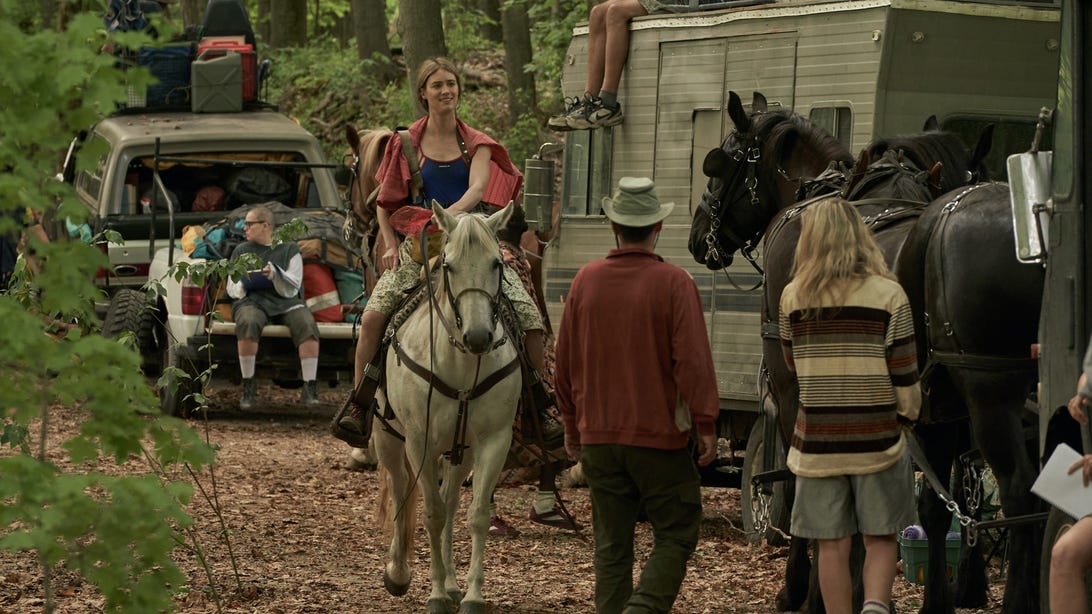Join or Sign In
Sign in to customize your TV listings
By joining TV Guide, you agree to our Terms of Use and acknowledge the data practices in our Privacy Policy.
Station Eleven Review: HBO Max Apocalyptic Drama Brings a Generous Spirit to a Timely Pandemic Story
The post-apocalyptic miniseries offers hope right when we need it

Mackenzie Davis, Station Eleven
Ian Watson/HBO MaxHBO Max's new sci-fi miniseries Station Eleven features some of the most terrifying imagery you'll see this (or any) year, but it's not really about doom and despair. Hopping around a timeline that covers the years leading up to the arrival of a pandemic that wipes out all but a sliver of the Earth's population and the decades that follow, it's less a story about the end of the world or post-apocalyptic existence and more about what happens in the spaces between crises, as well as the moments of connection created by people living through the worst history has to offer and still finding reasons to carry on — and ultimately doing more than carry on.
Much of the 10-part miniseries, created by Patrick Somerville (a novelist whose TV work includes Maniac and Made for Love), concerns the Traveling Symphony, a troupe of actors and musicians who, post pandemic, tour what's left of civilization in Michigan performing Shakespeare. Their vehicles include a wagon with the words "Survival is Insufficient" written on the side, which could double as the series' theme. Readers of the 2014 Emily St. John Mandel novel on which the series is based will recognize those as words (borrowed, with attribution, from an episode of Star Trek: Voyager) that recur throughout the book. They'll also recognize the novel's generous spirit, even though Somerville's adaptation freely expands on and alters much of the plot while keeping the emphasis on how art and relationships (and relationships forged around art) make life worth living even amidst the ruins.
The Best TV Shows and Movies on HBO and HBO Max in December
The first three episodes debut simultaneously on HBO Max on December 16th, and while streaming services' release strategies sometimes don't seem to have a lot of logic behind them, this one makes sense. They share overlapping events and a constant tone but the first three installments almost seem like they could come from different series. In the first we meet Jeevan (Himesh Patel), a Chicagoan who, while attending a performance of King Lear, recognizes that Arthur Leander (Gael García Bernal), a movie star searching for artistic satisfaction via performing Shakespeare, seems to be having a heart attack. Leaping onto the stage, Jeevan finds his instincts are correct and also that there's really nothing he can do for Arthur. He can, however, take care of Kirsten (played as a child by Matilda Lawler in a terrific performance), an eight-year-old actor who doesn't have a way to get home. As the two make their way back to Kirsten's house, Jeevan starts to recognize that the world is falling apart. Warned by his sister, a doctor, to take shelter, and unable to locate Kirsten's parents, Jeevan loads up on groceries and holes up in the skyscraper apartment of their reclusive brother Frank (Nabhaan Rizwan).
It's only in the episode's final moments that we meet the grown-up Kirsten (Mackenzie Davis) who, twenty years later, has become a key member of the Traveling Symphony. She both plays whatever roles their latest production requires and wields a knife against anyone who might be a threat to her or her friends, including a creepy, bearded admirer (Daniel Zovatto) whose story of how he came to be wandering the Michigan woods doesn't quite check out. That encounter takes up much of the second episode before the third introduces yet another major character and another timeframe, following Miranda (Danielle Deadwyler), a logistics expert and amateur artist, as she falls into a romance with Arthur some years before his fateful performance of Lear. As the relationship deepens, she spends her spare hours working on Station Eleven, a lyrical graphic novel that will ultimately enjoy an extremely limited print, including a copy that Kirsten will carry with her, and return to for inspiration, throughout her life.

Himesh Patel and Matilda Lawler, Station Eleven
Parrish Lewis/HBO MaxPart of the pleasure of Station Eleven comes from watching the ways the series connects the dots, filling in blanks in its story while finding echoes between moments separated by years and miles. As Miranda's boss points out during a job interview, the shortest path between two points isn't always the right path. By skipping about, Station Eleven can show, for instance, how the kindness of Arthur's brief mentorship of Kirsten has rippled throughout her life and how Miranda's desire to express herself via comics has lasting effects long after she's put down the page. The world has seen an avalanche of disaster and brutality visited upon it by the pandemic and what followed, but selflessness and a search for meaning have somehow survived, flames kept alive, the series suggests, by the fundamental elements that make us human. The darkness and senselessness of the world it depicts only makes them shine brighter.
About that darkness: Station Eleven's arrival is either poorly or perfectly timed. It's possible that some viewers simply won't have the stomach for a depiction of a deadly, destabilizing pandemic right now and the eeriness with which Station Eleven's inciting event (confined largely to the first episode) mirrors and intensifies the COVID-19 outbreak is unnerving at times. The news at first seems unreal and distant. Ordinary people convince themselves it will blow over without affecting them. Then it hits with a deadliness that can't be denied. But while the similarities are coincidental — the book came out years before and the series began filming in Jan. 2020, months before the pandemic struck — it only makes Station Eleven's themes that much more resonant. There's nothing to get you thinking about what really matters than seeing how rickety the foundations of civilization can be, and the humaneness of the answers Station Eleven offers feel more comforting than troubling.
At times they might be a little too comforting, particularly in later episodes' handling of someone who would seem to be beyond redemption. It's in later installments, too, that some of the supporting characters start to feel nebulous and squishily inconsistent. These ultimately feel like minor problems, however, in a series filled with stylish direction — from Atlanta's Hiro Murai — and remarkable performances from Davis and Patel and a supporting cast that, in addition to Lawler and Bernal, includes strong work from Lori Petty, David Cross, and Irish character actor David Wilmot. All play characters made tough by a dangerous world but trying to hold onto the tenderness that gives life meaning.
TV Guide rating: 4/5
The first three episodes of Station Eleven are out now on HBO Max, with new episodes coming weekly.